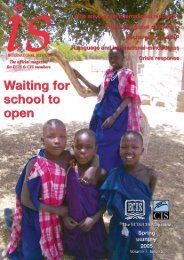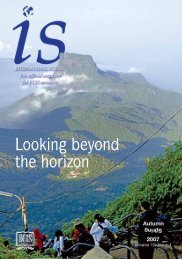is magazine 8.1 - Autumn/Spring 2005 - International Schools ...
is magazine 8.1 - Autumn/Spring 2005 - International Schools ...
is magazine 8.1 - Autumn/Spring 2005 - International Schools ...
Create successful ePaper yourself
Turn your PDF publications into a flip-book with our unique Google optimized e-Paper software.
From international to intercultural<br />
pare their daughters for life and work in our future global marketplace.<br />
The Boarding House which, in earlier decades, provided a<br />
home for generations of country Victorian girls, has also become<br />
so popular with families from SE Asia in particular, that it <strong>is</strong> oversubscribed<br />
and the boarding house <strong>is</strong> being extended. Boarders<br />
are supported by special orientation and ongoing cross-cultural<br />
seminars including welcome lunches with non-boarders to help<br />
them settle into their new home, school and country.<br />
It <strong>is</strong> a challenge for staff to provide an harmonious and tolerant<br />
home for nearly 100 teenagers! With girls coming from<br />
Australia, Europe, Hong Kong, Malaysia, Singapore, China,<br />
Indonesia, the Philippines, South Korea, Japan, the Middle East,<br />
Brunei, Thailand and Taiwan to live together at PLC, staff too<br />
are being trained with the skills to facilitate intercultural understanding<br />
in the busy, demanding day-to-day life of the Boarding<br />
House.<br />
There are currently almost 60 international boarders at PLC<br />
and many international students attend the College as day-girls<br />
because their families take up residence here for the duration of<br />
their daughters studies in Australia. These family members are<br />
often homesick and <strong>is</strong>olated and need to be encouraged to engage<br />
in the life of the school in a meaningful way. Amongst the almost<br />
1500 students in the PLC community, there are many who come<br />
from multicultural, particularly Asian backgrounds. Clearly, girls<br />
from Asia feel very comfortable in a College which <strong>is</strong> sincere and<br />
serious in its attempts to embrace and celebrate the uniqueness of<br />
all students.<br />
However it takes time to feel a sense of acceptance. As one girl<br />
from Hong Kong wrote about her initial period as a boarder: ‘I<br />
had few friends when I first came. It was hard for me to figure out<br />
what people here liked or d<strong>is</strong>liked. I was often scared my<br />
approach to things would make them think I was weird.<br />
Therefore I became quieter and quieter and it soon became too<br />
hard to make any friends at all.’<br />
Australian girls from Caucasian backgrounds are given the<br />
opportunity to experience other cultures on a daily bas<strong>is</strong> while<br />
‘More Australians learn<br />
Asian than European languages<br />
at school and PLC, based in a<br />
city which delights in its multicultural<br />
mix, teaches Chinese<br />
(Mandarin), Indonesian and<br />
Japanese. As a former<br />
Indonesian teacher said, while<br />
it was wonderful that her students<br />
went on to become skilled<br />
teachers in Indonesian, what<br />
delighted her was when her students<br />
were employed in influential<br />
government positions<br />
because they knew “how<br />
Indonesians think”...’<br />
learning of the richness of their Australian heritage. All girls are<br />
being prepared for their future employment, which for many will<br />
involve global positions particularly in Asia. As the overwhelming<br />
response shown by both the Australian Government and<br />
Australians themselves, to the Bali bombing and recent tsunami<br />
tragedies, the future of Australia and the countries of Asia are<br />
inextricably linked, not just on the economic, security and<br />
tour<strong>is</strong>m levels, but more importantly through personal and emotional<br />
ties of friendship as well.<br />
Th<strong>is</strong> cultural diversity has been embraced by staff, students and<br />
the PLC community at large and activities have moved beyond<br />
the merely show-and-tell presentations at traditional national<br />
days and <strong>International</strong> week to a deeper, more reciprocal endeavours<br />
like INTERWeave, the PLC <strong>International</strong> <strong>magazine</strong>. It <strong>is</strong><br />
here in frank, poignant, funny and provocative writing and illustrations<br />
that we see what it means to be a student in the intercultural<br />
world of PLC.<br />
We read the w<strong>is</strong>tful, thoughtful response of a Third Culture<br />
Kid who d<strong>is</strong>agreed strongly to the comment, given at a talk to<br />
PLC students by the late David Pollock, “that being a TCK was<br />
not a bad thing”. She wrote, ‘Th<strong>is</strong> <strong>is</strong> not a piece to say that I<br />
enjoy my culturally diverse background. However, th<strong>is</strong> <strong>is</strong> not a<br />
piece to say that the move to Australia ruined my life. I still don’t<br />
know.’ It <strong>is</strong> in an atmosphere of trust and security that the girls<br />
are encouraged to really express the ambivalence they feel about<br />
being part of a globally mobile family.<br />
Making cross-cultural awareness, interaction and engagement<br />
the ‘every lesson, every day’ experience of teachers, students and<br />
admin<strong>is</strong>trators in not an easy task. It has required the entire PLC<br />
community to step outside its comfort zone and learn and then<br />
pract<strong>is</strong>e new social and professional behaviours. Teachers are now<br />
more aware of the inner struggles that students from overseas’<br />
education systems endure. As one girl wrote:<br />
‘I was quiet in class partially because it was not easy for me to<br />
express what I wanted to say in Engl<strong>is</strong>h. The other reason was<br />
simply that students in my old school had never been expected<br />
to have class d<strong>is</strong>cussions because we only had to rush to learn as<br />
much theory as we could for exams. It was also hard to have a<br />
conversation with someone who speaks Engl<strong>is</strong>h ten times more<br />
fluently than I do. Thus I was seldom involved in any class or<br />
extra-curricular activities.’<br />
Such honest comments help to break down the prejudice that<br />
many Asian girls are only interested in achieving brilliant results<br />
and have no time for music, drama or sport!<br />
There have been worries that the strong western European<br />
background of PLC, which dates back nine generations, would be<br />
watered down in the face of the increased number of students<br />
from India, Sri Lanka and South-East Asia. Th<strong>is</strong> has not been the<br />
case as the strong and enthusiastic involvement of over 4000<br />
people who celebrated the 130th Anniversary Twilight Picnic<br />
Scott<strong>is</strong>h-style showed! The recently formed PLC Pipes and<br />
Drums played stirring music, Junior School students performed<br />
Scott<strong>is</strong>h country dances and a Scott<strong>is</strong>h rock band upped the pace<br />
for the evening!<br />
PLC, through its teaching of French, German, Latin and<br />
Classical Greek continues to nurture the countries and cultures<br />
with which Australia has had long-establ<strong>is</strong>hed cultural and business<br />
relationships. The language immersion exchange programmes<br />
to Germany and France continue the College’s firm<br />
friendships with institutions in those countries as does the GAP<br />
program.<br />
More Australians learn Asian than European languages at<br />
school and PLC, based in a city which delights in its multicultural<br />
mix, teaches Chinese (Mandarin), Indonesian and<br />
Japanese. As a former Indonesian teacher said, while it was wonderful<br />
that her students went on to become skilled teachers in<br />
Indonesian, what delighted her was when her students were<br />
employed in influential government positions because they knew<br />
“how Indonesians think” and th<strong>is</strong> would be extremely helpful in<br />
furthering meaningful relationships at government to government<br />
level.<br />
PLC has a strong and dynamic exchange programme with<br />
schools in Japan and with Ge Zhe High School, its s<strong>is</strong>ter school<br />
14<strong>Spring</strong><br />
<strong>is</strong> <strong>Autumn</strong> <strong>2005</strong>




